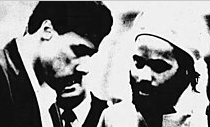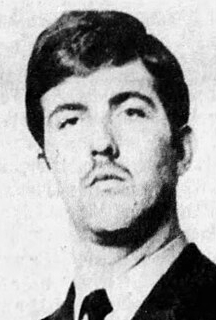
b: 1954
Summary
Name:
Mumia Abu-JamalYears Active:
1981Birth:
April 24, 1954Status:
ImprisonedClass:
MurdererVictims:
1Method:
ShootingNationality:
USA
b: 1954
Summary: Murderer
Name:
Mumia Abu-JamalStatus:
ImprisonedVictims:
1Method:
ShootingNationality:
USABirth:
April 24, 1954Years Active:
1981Date Convicted:
July 2, 1982bio
Mumia Abu-Jamal was born Wesley Cook on April 24, 1954, in Philadelphia, Pennsylvania. He grew up in a city that was full of challenges. Mumia was the eldest child in his family and had a younger brother named William. Both boys attended local public schools, where they learned about their community and the world around them.
In 1968, while in high school, Mumia’s teacher, a man from Kenya, encouraged his students to choose African or Arabic names. It was then that he was given the name "Mumia," which he has said means "Prince." This name was also associated with several Kenyan anti-colonial fighters.
At the age of 14, Mumia's life took a significant turn. He became involved with the Black Panther Party after he faced violence from white racists and a police officer while attempting to interrupt a rally. This happened during the campaign for independent candidate George Wallace, who was known for his racist views. Mumia worked with others to establish the Philadelphia branch of the Black Panther Party and took on the role of "Lieutenant of Information." In this position, he wrote news communications and helped share the Party's message. He dropped out of Benjamin Franklin High School and began living at the Black Panther headquarters.
Mumia spent some time away from Philadelphia in late 1969 and early 1970, working with other Party members in New York City and Oakland, California. His involvement with the Black Panthers lasted from May 1969 until October 1970. During this period, he was monitored as part of an FBI program aimed at disrupting radical groups.
After leaving the Panthers, Mumia returned to school to complete his education. However, he was soon suspended for promoting "black revolutionary student power." He even led a campaign to rename his school after Malcolm X, a prominent African-American leader. After earning his GED, he briefly attended Goddard College in Vermont before returning to Philadelphia.
As he transitioned to adulthood, Cook adopted the name Abu-Jamal, which means "father of Jamal" in Arabic, after his son was born on July 18, 1971. He married Biba, the mother of his first child, in 1973, but they divorced after having another child, Lateefa. He married again in 1977 to Marilyn, and they had a son named Mazi. This marriage also ended in divorce. He would go on to marry a third time to Wadiya, who remained his wife until her death in December 2022.
By the mid-1970s, Mumia began working in radio journalism. He started at Temple University's radio station and later moved to commercial stations in Philadelphia. He became known for his work covering important local events, including activities related to the MOVE organization, which was another radical group in Philadelphia. He earned respect as a journalist and served as president of the Philadelphia Association of Black Journalists from 1978 to 1980.
murder story
On December 9, 1981, at 3:55 a.m., Philadelphia police officer Daniel Faulkner stopped a vehicle driven by William Cook, who is Mumia Abu-Jamal's younger brother. During this stop, a physical confrontation occurred between Faulkner and Cook. Abu-Jamal, who was driving his taxi in the area, saw the altercation and parked his cab. He ran across the street towards Cook's vehicle.
In this scenario, Faulkner was shot in the back and face. He also shot Abu-Jamal in the stomach during the confrontation. Faulkner died at the scene due to a gunshot wound to his head.

After the shooting, police arrived and arrested Abu-Jamal, who was found wearing a shoulder holster. His revolver, containing five spent cartridges, was located beside him. He was taken to Thomas Jefferson University Hospital for treatment of his wound and was then taken to police headquarters, where he was charged with first-degree murder.
During the trial, the prosecution presented four eyewitnesses. One witness, Robert Chobert, a taxi driver parked behind Faulkner, identified Abu-Jamal as the shooter. Another witness, Cynthia White, testified that Abu-Jamal emerged from a parking lot and shot Faulkner. A motorist named Michael Scanlan also testified to seeing a man resembling Abu-Jamal shoot Faulkner. The fourth witness provided details about the traffic stop itself.
Two witnesses from the hospital where Abu-Jamal was treated claimed that he made a confession to them, stating, "I shot the motherfucker, and I hope the motherfucker dies." A .38 caliber revolver belonging to Abu-Jamal was found at the scene, and forensic evidence linked bullet fragments from Faulkner's body to that weapon. However, tests to confirm if Abu-Jamal had fired the weapon were not conducted.
The defense argued that Abu-Jamal was innocent and claimed that the prosecution witnesses were unreliable. They presented character witnesses who described Abu-Jamal as a peaceful man. One defense witness suggested a "running man" may have been the real shooter, though he did not seen the actual shooting.
After a brief deliberation, the jury found Abu-Jamal guilty. In the sentencing phase, Abu-Jamal read a statement expressing his belief that the trial had not been fair and that his rights were violated. He was sentenced to death, with the jury unanimously agreeing to this sentence.

Abu-Jamal's legal team undertook numerous appeals throughout the years, seeking to overturn the conviction. The Pennsylvania Supreme Court rejected his appeals multiple times. In December 2001, a federal district court overturned his death sentence due to issues in the penalty phase of the trial.
In 2011, prosecutors announced that they would no longer seek the death penalty for Abu-Jamal. Instead, he was sentenced to life in prison without the possibility of parole. Abu-Jamal was later moved from death row to the general prison population.
While imprisoned, he has written extensively and has become a prominent commentator on social and political issues. His case remains controversial, with varying opinions on the fairness of the trial and the evidence presented against him.